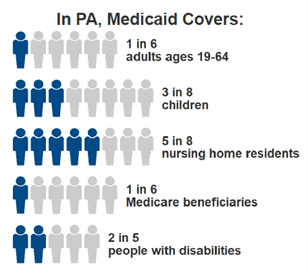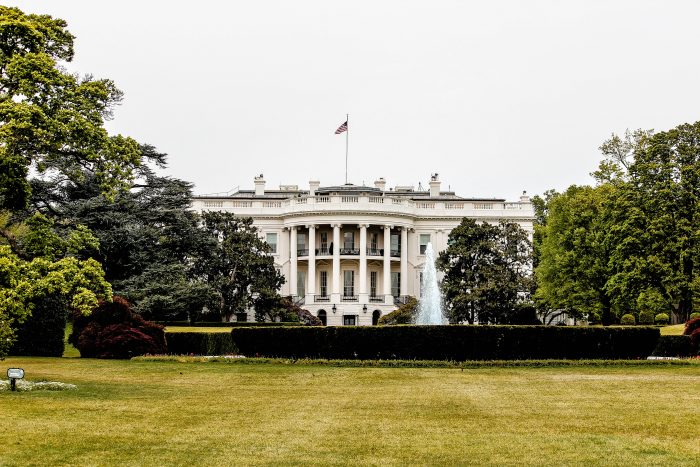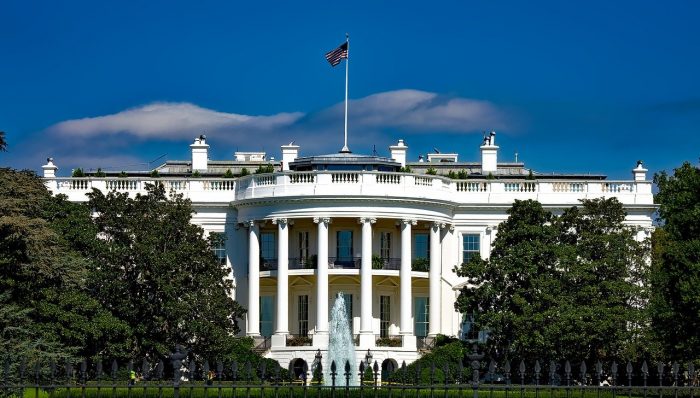Federal Funding
State Representative Dan Miller to Host “The Defense of Medicaid” Press Conference Feb. 28

Message from Representative Dan Miller’s Office:
Supporting and defending Medicaid funding to our Commonwealth has always been a top priority of mine, and this week we’re having a press conference to discuss the potential impact that Federal cuts to Medicaid may have on our most vulnerable populations.
Joining me will be U.S. Reps. Chris Deluzio and Summer Lee, other state lawmakers, and Allegheny County officials to highlight why defending Medicaid is imperative. We will also hear from self-advocates who would be directly impacted by Medicaid changes.
 The loss of Federal funding to states would be devasting for the more than 3 million Pennsylvanians who are enrolled in Medicaid. Medicaid also pays for 30% of Medicare. Those that depend on its supports and services, include:
The loss of Federal funding to states would be devasting for the more than 3 million Pennsylvanians who are enrolled in Medicaid. Medicaid also pays for 30% of Medicare. Those that depend on its supports and services, include:
- Seniors
- Low-income families and individuals
- People with disabilities
- Pregnant women and children, and many more.
The news conference will be held at 10:15 am Friday, February 28, at the Portico of the City-County Building, 414 Grant St., Pittsburgh.
We’ll also be joined by state Reps. Dan Frankel, Emily Kinkead, Jess Benham, Lindsay Powell, Aerion Abney, La’Tasha D. Mayes and Arvind Venkat; state Sens. Jay Costa, Wayne Fontana, Lindsey Williams and Nick Pisciottano; Mayor Ed Gainey; Allegheny County Controller Corey O’Connor; Pittsburgh Councilwoman Erika Strassburger; and the offices of County Executive Sara Innamorato and U.S. Sen. John Fetterman.
There is a lot to be discussed, and everyone is welcome to join us this Friday at 10:15 am at the Portico of the City-County Building located at 414 Grant Street in downtown Pittsburgh.
As always, if you have questions about this event or any state-related matter, please contact our office at 412-343-3870 or [email protected].
|
|
National Council Webinar for Update on Federal Policy Developments on Feb. 6
Second Federal Judge Issues Temporary Restraining Order
Message from ANCOR:
A second federal judge has blocked the freeze on federal spending noticed earlier in the week through a memo from OMB.
The order directs the Trump Administration not to “pause, freeze, impede, block, cancel, or terminate defendants’ compliance with awards and obligations to provide federal financial assistance to the states, and defendants shall not impede the states’ access to such awards and obligations” until further arguments can be heard.
The order does not prevent the review of federal programs, only the freeze on federal spending during the review. The OMB memo was rescinded prior to the issuance of the order, but the judge expressed earlier in the week that he was not persuaded that withdrawing the memo removed the underlying harm.
A hearing is expected Monday on the previous restraining order issued earlier in the week. We’ll keep you posted as we learn more.
Lydia Dawson, JD
ANCOR | Vice President of Government Relations
571-932-5375
Updated Guidance on Federal Funds Freeze: January 30, 2025

RCPA provided some late updates yesterday on the Federal funding freeze, and late last evening, the National Council for Mental Wellbeing provided members a legal interpretation on the rescinding of the Office of Management and Budget (OMB) M-25-13 and the issuance of the new memorandum M-25-14.
The following is from the National Council:
On Wednesday afternoon, the White House Office of Management and Budget issued a new memorandum—M-25-14 — that rescinded the pause to federal funding contemplated in a previous memorandum first issued on Monday night.
The new memorandum, which was directed to “heads of executive departments and agencies,” features a two-sentence statement reading: “OMB Memorandum M-25-13 is rescinded. If you have questions about implementing the President’s Executives Order, please contact your agency General Counsel.”
In the short term, M-25-14 certainly relieves some of the confusion and anxiety that swept across the federal grants world since Monday night. Our previous client alerts have chronicled the chaos that emerged late Monday and throughout the day on Tuesday.
However, in our review, there are still five key Executive Orders issued by the Trump Administration not affected by the rescission of M-25-13. Those EOs include:
- Reevaluating and Realigning United States Foreign Aid, directly addressing foreign assistance funding;
- Unleashing American Energy, freezing all programmatic funding for “green new deal” programs;
- Protecting the American People Against Invasion, freezing Department of Justice and Department of Homeland Security programs and contracts pending a review of immigration enforcement programs;
- Ending Radical and Wasteful Government DEI Programs and Preferencing, terminating all DEIA programs and activities in the federal government; and
- Ending Illegal Discrimination and Restoring Merit-Based Opportunity, terminating all DEIA-funded grant programs and contracts.
While the upheaval following the issuance of M-25-13 may have prompted the Trump Administration to change course and move away from pausing all federal funding, we certainly anticipate that federal grants in the above-listed areas will remain subject to a comprehensive review and new standards. Federal grantees with programs in these specific areas should undertake a detailed review and be prepared for future agency actions.
Federal grantees should continue to keep apprised of the Administration’s actions, orders, and statements relating to federal funding — as the rescinded memorandum likely foretells future clashes as the Administration attempts to exert control over federal spending.
Chuck Ingoglia
President & CEO
Strategic Leadership
National Council for Mental Wellbeing
In addition, ANCOR sent the following information last night:
In what’s turning from a whirlwind couple of days into a whirlwind week, there were notable updates today on the OMB memo on the freeze of certain federal funding issued earlier in the week.
Today OMB withdrew the memo with a simple rescission statement after a federal judge temporarily blocked the funding freeze for open awards and current spending. The order remains in effect until February 3 when a hearing is scheduled to determine next steps.
As you may have seen, later in the day, Press Secretary Karoline Leavitt posted to X, “[t]his is NOT a rescission of the federal funding freeze. It is simply a rescission of the OMB memo. Why? To end any confusion created by the court’s injunction. The President’s EO’s on federal funding remain in full force and effect, and will be rigorously implemented.” Without further specificity regarding the implicated executive orders, the situation remains fluid with the potential for later memos or other interpretive guidance which the White House maintains is authority held within the executive branch.
In other litigation, U.S. District Judge Jack McConnell made statements in court today indicating that another restraining order may be coming. With the memo rescinded, the Department of Justice Special Counsel argued the case is no longer relevant. However, the judge did not appear persuaded and asked for a draft protective order for response and consideration.
We’ll continue to keep you posted as we know more and hope to see you Friday (1/31) for our extended Members-Only Weekly Briefing at 12:30 pm ET to provide updates and review all available information together. See login information below:
Join Zoom Meeting: ancor-org.zoom.us/j/…
Meeting ID: 870 2745 7284
Passcode: 977618
In recent communications from the OMB, these actions will not impact programs that provide direct benefits to individuals and are explicitly excluded from the pause and exempted from this review process. In addition to Social Security and Medicare, already explicitly excluded in the guidance, mandatory programs like Medicaid and SNAP will continue without pause.
RCPA will continue to communicate new developments with members as they emerge. If you have any questions, please contact your RCPA Policy Director.
Update Regarding Federal Funding Freeze

RCPA continues its efforts to update members on the White House funding freeze while partnering with the National Council for Mental Wellbeing and ANCOR in examining the implications stemming from the White House Office of Management and Budget’s (OMB) January 27 memorandum temporarily freezing federal disbursements to many federal programs.
The National Council has provided the following update:
Federal agencies have been directed to fill out a spreadsheet as part of an analysis by Feb. 7 to ensure compliance with the president’s most recent executive orders. This is a breakdown of which health programs are included in this latest action.
Notably, we recognize conflicting guidance has been issued. While the above report identifies Medicaid programs, a Q&A document from the administration notes that Medicaid will continue without pause. As of Tuesday morning, all 50 states reported outages of their Medicaid online portals, and the Trump administration has stated they are aware of the outages and expect the portals to be back online shortly.
Also, several groups have taken action to block this funding freeze. As of this writing, several Democratic state attorneys general said they would ask a court to block the freeze from taking effect. Several groups representing nonprofits, public health professionals and small businesses have already filed suit in D.C. asking the court to prevent the freeze from continuing. On Tuesday evening, U.S. District Court Judge Loren L. AliKhan issued a temporary stay on the funding freeze until Feb. 3 at 5:00 pm ET.
The funding freeze may lead to project delays or cancellations, resulting in layoffs of workers involved in these programs, and may ultimately increase the unemployment rate, making it vital lawmakers understand the impact of this freeze on communities across the country.
Most notable are the concerns with the intersects of Medicaid funding though the information that has been released. The Q&A document states:
Q: Is this a freeze on benefits to Americans like SNAP or student loans?
A: No, any program that provides direct benefits to Americans is explicitly excluded from the pause and exempted from this review process. In addition to Social Security and Medicare, already explicitly excluded in the guidance, mandatory programs like Medicaid and SNAP will continue without pause.
RCPA will continue to communicate new developments with members as they emerge. If you have any questions, please contact your RCPA Policy Director.
Update: Judge Blocks Trump’s Spending Freeze

A federal judge has halted President Donald Trump’s freeze on federal aid programs, ruling that the courts need more time to consider the potentially far-reaching ramifications of his order.
Minutes before the directive from Trump’s budget office was to take effect Tuesday, U.S. District Judge Loren AliKhan blocked the Trump administration from implementing it for now.
AliKhan’s order will expire February 3 at 5:00 pm. The Trump administration cannot suspend disbursement of any congressionally-appropriated funds until then. The judge described the move as a “brief administrative stay” intended to maintain the status quo while further litigation can play out.
“I think there is the specter of irreparable harm,” said AliKhan, an appointee of President Joe Biden.
The ruling is a win for nonprofit and public health groups who said even a brief implementation of Trump’s freeze could cause devastating outcomes for people who rely on federal funds for services, as well as the workers who provide them. The nonprofits also argued the order from the Office of Management and Budget intrudes on First Amendment rights by seeking to block funding for groups that engage in “DEI programs” or promote “Gender Ideology Extremism,” concepts targeted in Trump’s initial round of executive orders.
Justice Department attorney Daniel Schwei had argued that the groups had failed to show that they needed an immediate halt to the order issued by Trump’s budget office and set to take effect at 5:00 pm Tuesday. He said additional guidance offered by the Trump administration should alleviate concerns about the OMB directive cutting off essential programs.
“They request sweeping relief… not tethered to any identified grant programs,” Schwei said. “It would be appropriate to allow these issues to be addressed on a more orderly timeframe.
RCPA will continue to update members as we work with our national partners to gain greater clarification on this Federal action. If you have further questions, please contact your RCPA Policy Director.
Update: Temporary Pause of Agency Grant, Loan, and Other Financial Assistance Programs

DDAP Announces $15 Million in Provider Stabilization Payments
The Pennsylvania Department of Drug and Alcohol Programs (DDAP) announced more than $15 million in grant funding for stabilization payments to substance use disorder (SUD) treatment providers to assist with pandemic-related expenses.
Through 108 grant agreements, 375 SUD treatment provider locations will receive funding. Grantees span across every Pennsylvania county, and all eligible applicants who applied were awarded funding. A list of grantees and awards are available on the DDAP website. However, funding amounts will not be finalized until all grant agreements are fully executed. This funding will aid in pandemic-related expenses, including but not limited to minimizing the spread of COVID-19 by ensuring the provision of testing and support of vaccines as appropriate and delivering quality, evidence-based treatment to individuals who are underinsured or uninsured.
The grants are part of $55 million in federal funding awarded to Pennsylvania through the Substance Abuse and Mental Health Services Administration (SAMHSA) Substance Abuse Prevention and Treatment Block Grant Program COVID-19 Supplemental Awards.










